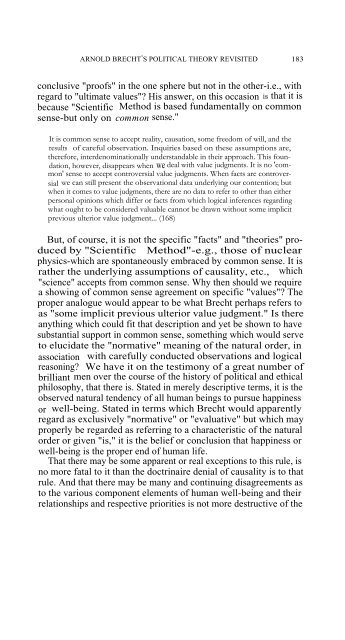ARNOLD BRECHT'S POLITICAL THEORY REVISITED Political ...
ARNOLD BRECHT'S POLITICAL THEORY REVISITED Political ...
ARNOLD BRECHT'S POLITICAL THEORY REVISITED Political ...
Create successful ePaper yourself
Turn your PDF publications into a flip-book with our unique Google optimized e-Paper software.
<strong>ARNOLD</strong> BRECHT ' S <strong>POLITICAL</strong> <strong>THEORY</strong> <strong>REVISITED</strong> 183<br />
conclusive "proofs" in the one sphere but not in the other-i.e., with<br />
regard to "ultimate values"? His answer, on this occasion is that it is<br />
because "Scientific Method is based fundamentally on common<br />
sense-but only on common sense."<br />
It is common sense to accept reality, causation, some freedom of will, and the<br />
results of careful observation. Inquiries based on these assumptions are,<br />
therefore, interdenominationally understandable in their approach. This foundation,<br />
however, disappears when we deal with value judgments. It is no 'common'<br />
sense to accept controversial value judgments. When facts are controversial<br />
we can still present the observational data underlying our contention; but<br />
when it comes to value judgments, there are no data to refer to other than either<br />
personal opinions which differ or facts from which logical inferences regarding<br />
what ought to be considered valuable cannot be drawn without some implicit<br />
previous ulterior value judgment... (168)<br />
But, of course, it is not the specific "facts" and "theories" produced<br />
by "Scientific Method"-e.g., those of nuclear<br />
physics-which are spontaneously embraced by common sense. It is<br />
rather the underlying assumptions of causality, etc., which<br />
"science" accepts from common sense. Why then should we require<br />
a showing of common sense agreement on specific "values"? The<br />
proper analogue would appear to be what Brecht perhaps refers to<br />
as "some implicit previous ulterior value judgment." Is there<br />
anything which could fit that description and yet be shown to have<br />
substantial support in common sense, something which would serve<br />
to elucidate the "normative" meaning of the natural order, in<br />
association with carefully conducted observations and logical<br />
reasoning? We have it on the testimony of a great number of<br />
brilliant men over the course of the history of political and ethical<br />
philosophy, that there is. Stated in merely descriptive terms, it is the<br />
observed natural tendency of all human beings to pursue happiness<br />
or well-being. Stated in terms which Brecht would apparently<br />
regard as exclusively "normative" or "evaluative" but which may<br />
properly be regarded as referring to a characteristic of the natural<br />
order or given "is," it is the belief or conclusion that happiness or<br />
well-being is the proper end of human life.<br />
That there may be some apparent or real exceptions to this rule, is<br />
no more fatal to it than the doctrinaire denial of causality is to that<br />
rule. And that there may be many and continuing disagreements as<br />
to the various component elements of human well-being and their<br />
relationships and respective priorities is not more destructive of the
















